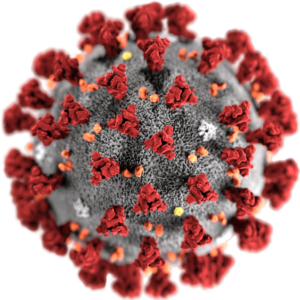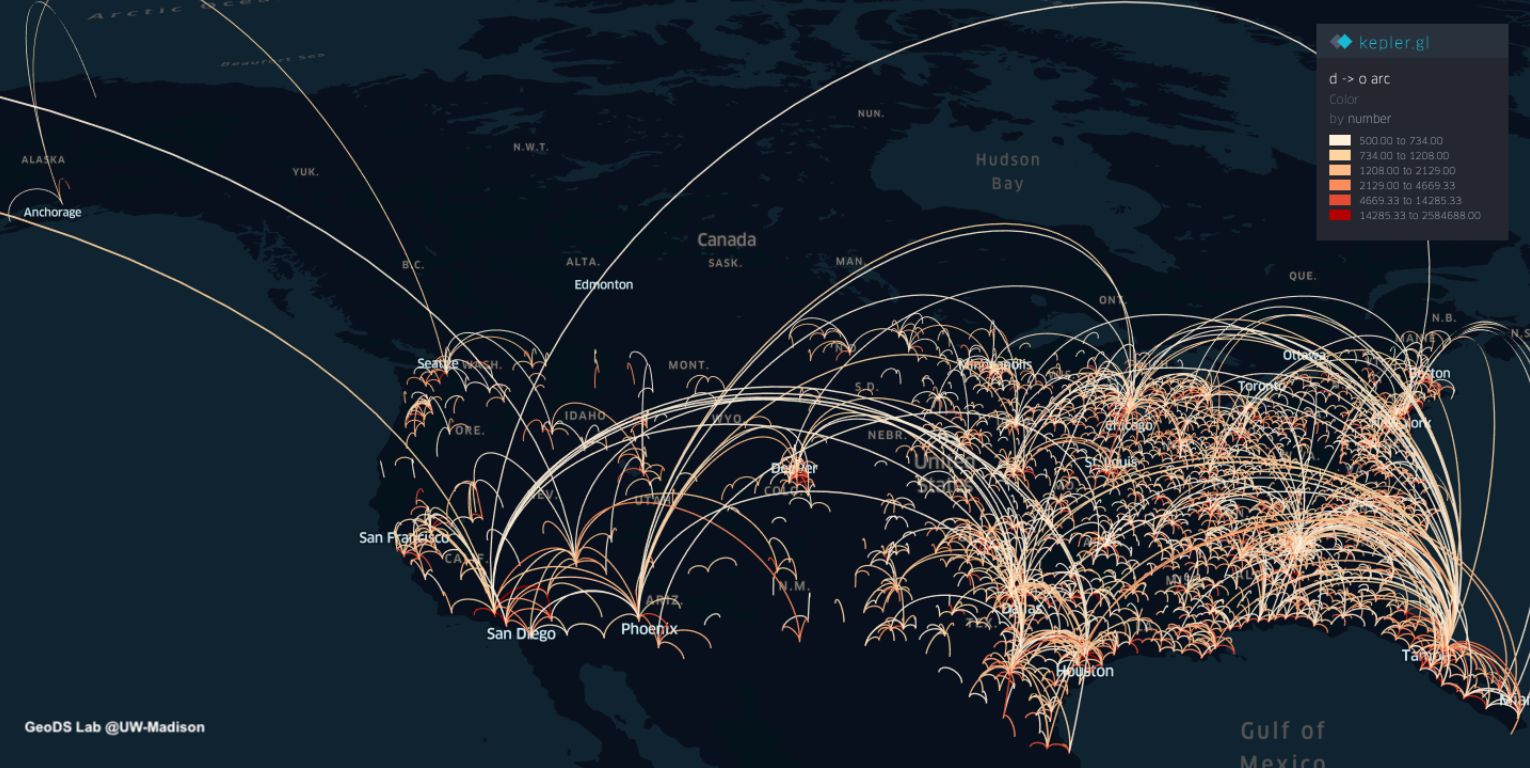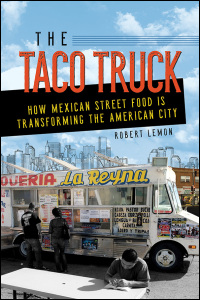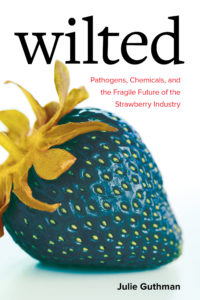Newsletter – May 2020
PRESIDENT’S COLUMN
Facing an Existential Crisis or COVID-19 and the Long-Term Future of Geography
By David Kaplan
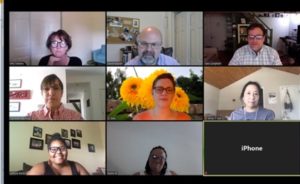
It does not seem so long ago that people were talking about the compression of space and time, about the “ends of history and geography.” How recent events have obliterated this! The pandemic of COVID-19—with its echoes of the 1918 Spanish Flu and the great contagious scourges of the past—demonstrates again that “history doesn’t repeat itself, but it often rhymes.” And how well this pandemic also affirms geography’s significance! The importance of place, of distance, of context, of networks—all show the enduring importance of geography and how central geographical concerns are in understanding the disease.
ANNUAL MEETING
Save the Date for AAG Seattle!
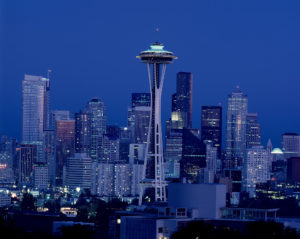
Join us for the AAG Annual Meeting April 7-11, 2021. We invite you to organize and participate in sessions, workshops, field trips, special events, and activities. Look for the call for papers in July 2020. We look forward to seeing you in the Pacific Northwest!
Virtual Session Recordings Available until May 14!
AAG facilitated a virtual annual meeting April 6-10, in response to restrictions on travel and gathering during the COVID-19 pandemic. The virtual conference hosted more than 180 sessions and panels. Recordings of most sessions are available through May 14 in the online session gallery.
- Register for access to the 2020 Virtual AAG Annual Meeting recordings
- View the Session Recordings in the Online Gallery
- Submit a 2020 AAG Annual Meeting Cancellation Request
PUBLICATIONS
NEW Annals of the American Association of Geographers Issue Alert:
Articles with topics ranging from unusually devastating tornadoes to offshore wind power to contemporary Mongolian pastoralism

The most recent issue of Annals of the American Association of Geographers has been published online (Volume 110, Issue 3, May 2020) focusing on current geographic research. Topics in this issue include geoprivacy, data activism, hazard prediction maps, local food systems, countermapping, conservation law enforcement, The Holocaust, Burmese migrants, Nigerian geographers, and extractive economies. Regional areas of interest include the Big Thicket National Preserve in southeast Texas; Shijiazhuang, China; Taiwan; the Yellowstone River in eastern Montana; and Gangnam District, Seoul. Authors are from a variety of research institutions including: Durham University, University of Kentucky, Florida State University, University of Nottingham, and University of Oxford.
All AAG members have full online access to all issues of the Annals through the Members Only page. Each issue, the Editors choose one article to make freely available. In this issue you can read Disturbance after Disturbance: Combined Effects of Two Successive Hurricanes on Forest Community Structure by Daehyun Kim, Andrew C. Millington & Charles W. Lafon for free for the next two months.
Questions about the Annals? Contact annals [at] aag [dot] org.
NEW The Professional Geographer Issue Alert:
Research featuring sonic methods to urban growth models to participatory data
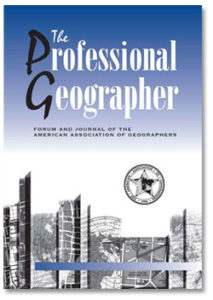 The latest issue of The Professional Geographer is now available (Vol 72, Issue 2, May 2020) with 10 new research articles in geography that emphasize applied studies. Topics include banking deserts, Twitter use among Geography Departments, fieldwork in geography, and migration. Study areas include Albuquerque; Flushing, Queens, New York City; and the Hubei and Hunan Provinces of China. Authors are from a variety of global institutions including: University of Tennessee, Salzburg University, and University of California, Santa Cruz.
The latest issue of The Professional Geographer is now available (Vol 72, Issue 2, May 2020) with 10 new research articles in geography that emphasize applied studies. Topics include banking deserts, Twitter use among Geography Departments, fieldwork in geography, and migration. Study areas include Albuquerque; Flushing, Queens, New York City; and the Hubei and Hunan Provinces of China. Authors are from a variety of global institutions including: University of Tennessee, Salzburg University, and University of California, Santa Cruz.
All AAG members have full online access to all issues of The Professional Geographer through the Members Only page. In every issue, the editors choose one article to make freely available for three months. In this issue you can read Examining Spatial Disparities of Obesity: Residential Segregation and the Urban–Rural Divide by Heewon Chea & Hyun Kim for free for the next three months.
Questions about The PG? Contact profgeog [at] aag [dot] org.
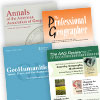 In addition to the most recently published journal, read the latest issue of the other AAG journals online:
In addition to the most recently published journal, read the latest issue of the other AAG journals online:
• Annals of the American Association of Geographers
• The Professional Geographer
• GeoHumanities
• The AAG Review of Books
NEW Spring Issue of the AAG Review of Books Published
 The latest issue of The AAG Review of Books is now available (Volume 8, Issue 2, Spring 2020) with 5 book reviews on recent books related to geography, public policy and international affairs. The Spring 2020 issue also includes four book review discussions and two book review essays. The Spring 2020 Issue features two items selected by the editor to be made available free of charge: Mustafa Dikeç’s book review of Revolting New York: How 400 Years of Riot, Rebellion, Uprising, and Revolution Shaped a City, by Neil Smith and Don Mitchell and a Book Review forum by Elizabeth Johnson, Christian Anderson, Becky Mansfield, Shiloh Krupar, Julia Corwin, Scott Prudham and Jesse Goldstein of Jesse Goldstein’s Planetary Improvement: Cleantech Entrepreneurship and the Contradictions of Green Capitalism.
The latest issue of The AAG Review of Books is now available (Volume 8, Issue 2, Spring 2020) with 5 book reviews on recent books related to geography, public policy and international affairs. The Spring 2020 issue also includes four book review discussions and two book review essays. The Spring 2020 Issue features two items selected by the editor to be made available free of charge: Mustafa Dikeç’s book review of Revolting New York: How 400 Years of Riot, Rebellion, Uprising, and Revolution Shaped a City, by Neil Smith and Don Mitchell and a Book Review forum by Elizabeth Johnson, Christian Anderson, Becky Mansfield, Shiloh Krupar, Julia Corwin, Scott Prudham and Jesse Goldstein of Jesse Goldstein’s Planetary Improvement: Cleantech Entrepreneurship and the Contradictions of Green Capitalism.
Questions about The AAG Review of Books? Contact aagreview [at] aag [dot] org.
ASSOCIATION NEWS
A Special Thank You from our Executive Director
Earlier this month, AAG unveiled our COVID-19 Rapid Response Task Force. Immediately, 125 of you stepped up to offer your time as volunteers, including many students. This generosity was in keeping with the earlier support AAG members offered one another when we had to rapidly pivot from an in-person Annual Meeting to a virtual meeting: 239 of you, including 88 students, donated a portion of your registration fee back to AAG, raising $22,763 that helped us make the meeting such a success for more than 1,000 attendees. Just this week, in a matter of days, our community raised more than $4,800 for the COVID-19 Rapid Response Fund, which will support the Task Force proposals that AAG Council will set in motion in June.
As the reality of COVID-19’s impact has set in during these past months, these are only some of the examples of how you have rallied to show your commitment to the discipline of geography, to your colleagues, and to your place in AAG’s community. Your support makes it possible for us to strengthen geography while facing this unexpected challenge. I am deeply grateful to all of you who have volunteered, contributed to the Fund, and otherwise assisted each other and shown your support for our organization. We will continue to work hard to be there for you, as you have done for us.
AAG Substantially Revises Professional Conduct Policy
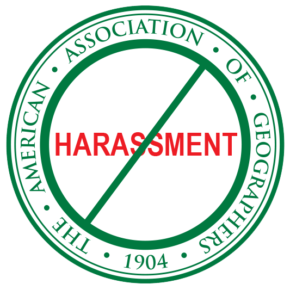 In April, AAG formally adopted a revised Professional Conduct Policy, signaling an important benchmark in the work of the Harassment-Free AAG Task Force, AAG Council, and AAG leadership and staff. Two years of the Task Force’s intensive reviews and discussions, including the 2019 Harassment-Free AAG Survey, contributed to the policy changes, which broaden the consideration of professional misconduct beyond AAG-sponsored events and into the field itself. Under the new policy, professional misconduct includes discrimination, sexual harassment, and bullying to the extent that such conduct relates to AAG activities or the professional roles of AAG members. The policy applies to all AAG members, staff, attendees and participants at any AAG-sponsored event, including online venues, and at AAG-sponsored meeting social events.
In April, AAG formally adopted a revised Professional Conduct Policy, signaling an important benchmark in the work of the Harassment-Free AAG Task Force, AAG Council, and AAG leadership and staff. Two years of the Task Force’s intensive reviews and discussions, including the 2019 Harassment-Free AAG Survey, contributed to the policy changes, which broaden the consideration of professional misconduct beyond AAG-sponsored events and into the field itself. Under the new policy, professional misconduct includes discrimination, sexual harassment, and bullying to the extent that such conduct relates to AAG activities or the professional roles of AAG members. The policy applies to all AAG members, staff, attendees and participants at any AAG-sponsored event, including online venues, and at AAG-sponsored meeting social events.
The revised 12-page policy also identifies standards for professional behavior and outlines processes for reporting and addressing violations, including an online form that can be used to submit a complaint.
2020 AAG Nystrom Award Recipient Announced

Marynia Kolak of the University of Chicago is the recipient of the 2020 J. Warren Nystrom Award, established by a former AAG Executive Director to annually recognize a paper based on a recent dissertation in geography. Kolak’s contribution, Distilling the Effect of the Great Recession on Food Access in a Segregated City: A Spatial, Quasi-Experimental Approach, is based on the dissertation she completed at Arizona State University in 2017. Kolak presented her paper along with three finalists, Kevin Mwenda of Brown University, Yago Martin Gonzalez of the University of South Carolina, and Mark Rhodes of Michigan Technological University, in a special session on Tuesday, April 7, 2020 at #AAGVirtual.
Learn more about the Nystrom Award and previous awardees.
AAG Signs On to Support Key Positions on COVID-19
In April, AAG participated in two letters to Congressional leaders, denouncing anti-Asian racist rhetoric, attacks, and discrimination during COVID-19 and supporting House Resolution 908, introduced in late March by Rep. Grace Meng (D-NY-6). A companion bill is expected to be introduced in the Senate by Senators Kamala Harris (D-CA), Tammy Duckworth (D-IL), and Mazie Hirono (D-HI).
Acting in concert with the AAAS and 49 other scientific institutions, AAG wrote to reject anti-Asian racism, especially in characterizing the COVID-19 virus. Instead, AAG and its colleague organizations vow to “focus on leveraging global human diversity to solve today’s public health crisis.” AAG also signed a letter along with more than 450 diverse organizations, spearheaded by the National Council of Asian Pacific Americans and the Democracy Initiative, in support of H.R. 908, affirming, “Hate and bigotry are not consistent with realizing the promise of American democracy where all of us have an equal voice.”
Need for GIS and Shared Data: Earlier this month, AAG was one of nine organizations that signed the National States Geographic Council’s letter in support of geo-enabling key data sets from public health and emergency response sectors, in order to gain better spatial insights into COVID-19. “[K]nowing where the outbreak is growing, where high-risk populations are, where the hospital beds and important medical resources are, and where to deploy resources is essential,” the letter stated, urging a nationwide effort to disaggregate existing data for improved nationwide spatial analysis.
Deadline Extended to List Your Geography Program in The Guide
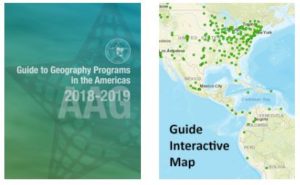 The American Association of Geographers is accepting entries from geography programs for the 2020 edition of the Guide to Geography Programs in the Americas. The deadline for submitting a listing has been extended to Friday, June 12, 2020.
The American Association of Geographers is accepting entries from geography programs for the 2020 edition of the Guide to Geography Programs in the Americas. The deadline for submitting a listing has been extended to Friday, June 12, 2020.
The 2020 edition of the Guide will be available exclusively online. The Guide lists undergraduate and graduate programs in all areas of geography and includes an interactive map that students can use to explore and discover geography programs, with easy-to-use search tools to find programs by degree type, region, and program specialization. It has long been an invaluable reference for faculty, prospective students, government agencies, and private firms in the United States, Canada, and throughout the world.
For more information and to list your program, please contact Mark Revell at guide [at] aag [dot] org.
New COVID-19 Resource Hub – Open to all AAG Members
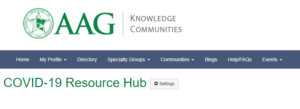 The AAG has set up a new Knowledge Community to facilitate communication and knowledge-sharing among our members during the COVID-19 pandemic. The COVID-19 Resource Hub is open to all current AAG members, and is free to join. We encourage members to use the hub to share resources and data, seek research collaborations and information, connect to colleagues across subdisciplines, and support each other as we all experience and seek to understand the impacts of this pandemic from local to global. The AAG has posted initial resources and discussion topics, and we encourage our membership community to make this resource and space your own. We also encourage you to share any COVID-19 related posts from specialty group communities with this new community if you would like to reach more members.
The AAG has set up a new Knowledge Community to facilitate communication and knowledge-sharing among our members during the COVID-19 pandemic. The COVID-19 Resource Hub is open to all current AAG members, and is free to join. We encourage members to use the hub to share resources and data, seek research collaborations and information, connect to colleagues across subdisciplines, and support each other as we all experience and seek to understand the impacts of this pandemic from local to global. The AAG has posted initial resources and discussion topics, and we encourage our membership community to make this resource and space your own. We also encourage you to share any COVID-19 related posts from specialty group communities with this new community if you would like to reach more members.
Join and contribute to the COVID-19 Resource Hub.
Call for Abstracts: AAG ‘Annals’ Special Issue on Displacements
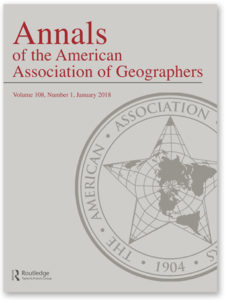 The 2022 Special Issue of the Annals of the American Association of Geographers will explore how — building on our history of critical engagement with place — geographers from across the discipline can contribute empirical, theoretical, and methodological insights on displacements and their implications. The AAG welcomes contributions that address displacements through multi- and inter-disciplinary engagements with geographical theory and methods, from a broad range of perspectives and locations, and in historical and contemporary contexts. Abstracts of no more than 250 words are invited by May 15, 2020.
The 2022 Special Issue of the Annals of the American Association of Geographers will explore how — building on our history of critical engagement with place — geographers from across the discipline can contribute empirical, theoretical, and methodological insights on displacements and their implications. The AAG welcomes contributions that address displacements through multi- and inter-disciplinary engagements with geographical theory and methods, from a broad range of perspectives and locations, and in historical and contemporary contexts. Abstracts of no more than 250 words are invited by May 15, 2020.
POLICY CORNER
EPA Rulemaking Jeopardizes Utilization of Geospatial Research
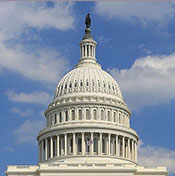
There is currently a rule under consideration by the Environmental Protection Agency (EPA) that is cause for major concern within the research community. The proposed Strengthening Transparency in Regulatory Science rule indicates that as the EPA uses scientific research to guide future policy decisions, preference will be given to studies which make their raw data publicly available. Consequently, this would allow the EPA discretion to discount research that does not fully disclose such data, which includes any findings that draw from personally identifiable medical and location information as well as proprietary data.
The American Association of Geographers (AAG), in partnership with the Urban and Regional Information Systems Association (URISA) and the University Consortium for Geographic Information Science (UCGIS), plans to submit a public comment expressing our opposition to this proposed rule.
While the principles of open data sharing and reproducibility are key to scientific integrity and advancement, certain health and environmental research are only possible when personally identifiable information is guaranteed to remain confidential. As organizations at the intersection of science, industry, and geospatial technologies, we fully appreciate that confidential and proprietary geospatial data, including remotely sensed satellite imagery, location tracking of individual mobility, and georeferenced demographic and health information (which can reveal identity), play essential roles in environmental and health research. We are deeply concerned that by favoring research in which data and models are made publicly available, the EPA will overlook or disregard findings from valid, scientific research.
The rule, first proposed in 2018, was recently modified in reaction to many of the comments originally received. However, the modifications fail to ameliorate the issues identified above.
You can make your voice heard on this proposed rule by visiting the public comments portal and submitting a response by the May 18th deadline. If feeling unsure on where to start, we recommend following this helpful guide from the Union of Concerned Scientists.
For additional background, watch this November 2019 hearing from the U.S. House Committee on Science, Space, & Technology entitled, “Strengthening Transparency or Silencing Science? The Future of Science in EPA Rulemaking.”
In the News:
- The latest results for the National Assessment of Educational Progress (NAEP) in geography have been released. Click here to explore the data and see where our nation’s eighth-graders stand.
- On April 24th, Congress passed its fourth stimulus bill addressing the COVID-19 crisis, the Paycheck Protection Program and Health Care Enhancement Act (H.R. 266). The bill provides funding for small business loans, health care providers, and additional COVID-19 testing.
MEMBER NEWS
Update: Geographers Act on COVID-19
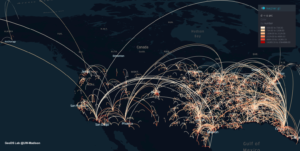
Our thanks to AAG members and geographers all over the world for sharing their work with us. Here are some of the efforts AAG has been hearing about:
Medical geographer Tolulope Osayomi of University of Ibadan has been interviewed frequently by the media about the value of lockdown procedures in Nigeria during COVID-19, including Vanguard Nigeria and Business Day.
Geographer Francesco De Pascale of L’Istituto di Ricerca per la Protezione Idrogeologica has worked with colleagues in geography and anthropology to collect testimonials from Italian citizens from within the spaces of their homes during COVID-19. The work, entitled “My lived space,” recalls the concept elaborated by the late French geographer Armand Frémont (1933-2019), defining lived space as “the space of individuals with which they appropriate, with their paths, their perceptions, their representations, their signs, their drives and passions” (2005). Dr. De Pascale and Giovanni Gugg of the University of Nice-Sophia Antipolis, Stefano Montes of the University of Palermo, and Gaetano Sabato of the University of Catania are collecting testimonies of “geographies of the home,” published in Il Sileno · Rivista Divulgativa (in Italian)
Geographer Charles Travis of Trinity College Dublin and University of Texas-Arlington has mapped social media posts about the COVID-19 pandemic.
In April, Arizona State University School of Geographical Sciences and Urban Planning and Spatial Analysis Research Center (SPARC) sponsored an online gathering on Digital Contact Tracing and Surveillance: A National Conversation with Geospatial Experts. Organized by ASU professor Trisalyn Nelson, the conversation examined what we currently know about the accuracy of cell phone GPS data, how social media can be used for tracking, and looming privacy issues posed by these capabilities. View the recorded meeting here.
Profiles of Professional Geographers
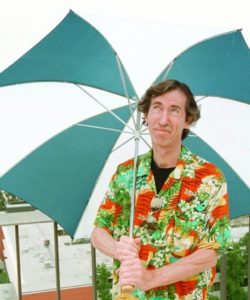
Geographers often have a background in meteorology and climatology like this month’s featured professional geographer, Stephen Ladochy, Professor Emeritus, California State University, Los Angeles, Department of Geosciences & Environment. Ladochy’s love of math got him interested in meteorology, but his job at the L.A. County Air Pollution Control District opened up a career path to pursuing a PhD and becoming a professor in Geography. He recommends geography students seek out internships or summer employment to give their career a boost!
Learn more about Geography Careers.
Geographers Honored this Spring
Katherine McKittrick, professor of gender studies at Queen’s University (and recipient of AAG’s 2019 Harold M. Rose Award for Anti-Racism Research and Practice); Diana Liverman, Regents Professor and director of the School of Geography and Development at the University of Arizona; and Lisa Naughton, professor of geography at University of Wisconsin-Madison were inducted as members of the American Academy of Arts & Sciences 2020 Class.
Liverman was also elected to the National Academy of Sciences, along with Marilyn Brown, Regents Professor and Brook Byers Professor of Sustainable Systems in the School of Public Policy at Georgia Institute of Technology.
In April, Frank Magilligan, Erica Schoenberger, and Lisa Brooks (Abenaki) have received Guggenheim Fellowships for their work in geography. Magilligan is a professor of geography at Dartmouth whose work examines how science, politics, & values intersect in river restoration. Schoenberger is a professor of environmental health and engineering at Johns Hopkins University, as well as a political and economic geographer and environmental historian with specialties in the history of technology. She is the author of the recent Nature, Choice, and Social Power (Routledge 2015). Brooks is Chair of American Studies at Amherst College. Her recent work includes The Common Pot: The Recovery of Native Space in the Northeast and the book and companion website Our Beloved Kin: A New History of King Philip’s War.
RESOURCES AND OPPORTUNITIES
News from the International Geographical Union (IGU)
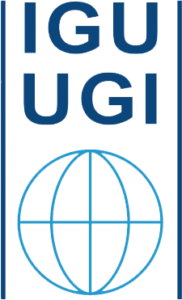
On April 2, 2020, the IGU postponed the 34th International Geographical Congress, originally scheduled to be held in August 2020, for one year. It has been re-scheduled for August 16-20, 2021 in Istanbul, Turkey. Fees already paid and abstracts accepted will be carried forward to 2021 and there will be opportunities to submit new papers. You can find further information about the IGU Congress and the IGU at https://igu-online.org/.
April 6 was to have been GeoNight (GéoNuit), an evening of public events that promote the discipline of geography. The annual April GéoNuit, launched in France in 2017, has gained in popularity in other countries, too. Events of any type, from public lectures to guided bike rides, have involved thousands of people. GeoNight events for 2020 were cancelled to avoid public gatherings, but geographers around the world can begin thinking about organizing Geo Night events for 2021.
Learn more about GeoNight (GéoNuit).
Comptroller Nominations Sought for Gamma Theta Upsilon
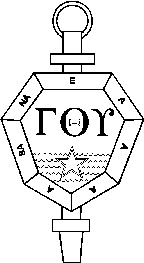
The Gamma Theta Upsilon (GTU) Nominations Committee seeks candidates for consideration as nominees for the position of comptroller. The volunteer comptroller position oversees the financial management of GTU, including general accounting, yearly budget preparation, creation of financial reports, overseeing the filing of taxes, and acting as the liaison in managing GTU’s investment portfolio. This is a five year position starting in January 2021. If you believe that you or someone you know has the talents and resources required, the nominations committee hopes that you’ll consider serving GTU as Comptroller, a position that is integral to the functioning of GTU.
More information about applying for the comptroller position.
IN MEMORIAM
John W. Webb
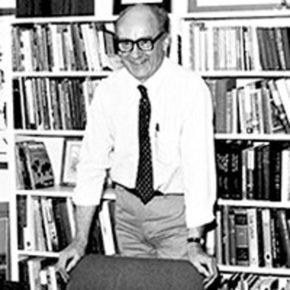
John W. Webb, 93, former Dean of Social Sciences and Professor of Geography, University of Albany (SUNY); former Professor of Geography, University of Minnesota; and co-author (with Jan O.M. Broek) of the world-wide best-selling text “A Geography of Mankind” (McGraw-Hill, 1968), died in St. Cloud, MN, on August 18, 2019.
Allen G. Noble
Allen G. Noble, 90, a longtime AAG member, Pulitzer-nominated author, and Distinguished Professor Emeritus at the University of Akron, Ohio, died on March 24, at age 90. Noble was recognized in 1989 with the AAG Honors, the highest award offered by the AAG, and was named one of Ohio’s Distinguished Scientists.
Ezekiel Kalipeni
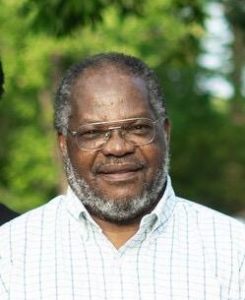 Ezekiel Kalipeni, a longtime geography professor, died in the early hours of April 11, 2020 from heart-related complications while he was in his native country, Malawi at age 66. Globally known for his work focusing on medical geography, population and environment, and international development in Africa, Kalipeni was the 2014 recipient of the Kwado-Konadu-Agyemang Distinguished Scholar in African Geography Award. He also served as editor of the African Geographical Review, enjoyed mentoring and teaching students, and established the Kalipeni Foundation to support local development projects in Malawi’s southern district of Mulanje.
Ezekiel Kalipeni, a longtime geography professor, died in the early hours of April 11, 2020 from heart-related complications while he was in his native country, Malawi at age 66. Globally known for his work focusing on medical geography, population and environment, and international development in Africa, Kalipeni was the 2014 recipient of the Kwado-Konadu-Agyemang Distinguished Scholar in African Geography Award. He also served as editor of the African Geographical Review, enjoyed mentoring and teaching students, and established the Kalipeni Foundation to support local development projects in Malawi’s southern district of Mulanje.
David Hornbeck
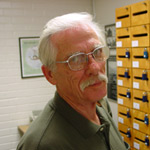 On Earth Day, 2020, COVID-19 claimed the life of Dr. David Hornbeck, Professor Emeritus, Department of Geography, California State University, Northridge. Hornbeck was particularly interested in both the historical geography of California during the mission and rancho periods and the development of GIS for business applications, particularly in banking. He was actively involved in career advising and development for students in his department and in developing his collection of papers, maps, and journals related to historical land use in California.
On Earth Day, 2020, COVID-19 claimed the life of Dr. David Hornbeck, Professor Emeritus, Department of Geography, California State University, Northridge. Hornbeck was particularly interested in both the historical geography of California during the mission and rancho periods and the development of GIS for business applications, particularly in banking. He was actively involved in career advising and development for students in his department and in developing his collection of papers, maps, and journals related to historical land use in California.
The AAG is also saddened to hear of the passing of Evan Weismann this past month with a written tribute forthcoming.
GEOGRAPHERS IN THE NEWS
- AAG Member and Geographer Jonathan Mayer interviewed by Wired about the importance of geography during the COVID-19 pandemic
- Derek Alderman and Michael Solem interviewed for article on geography educational achievement, The 74
- University of Oregon geography professor Leigh Johnson urges change in pandemic fund oversight, Around the O
- Geography professor Lisa Chaddock brings comfort to students despite campus closure, San Diego City Times
EVENTS CALENDAR
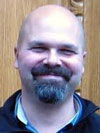 You hear it from everyone you know: these are strange and frightening times. While most of us have witnessed major disease outbreaks from afar – Ebola, SARS, Swine Flu – it is another thing to encounter something so directly, so personally, so comprehensively. Pandemic: what once seemed part of a grim historical record has smashed into our contemporary reality.
You hear it from everyone you know: these are strange and frightening times. While most of us have witnessed major disease outbreaks from afar – Ebola, SARS, Swine Flu – it is another thing to encounter something so directly, so personally, so comprehensively. Pandemic: what once seemed part of a grim historical record has smashed into our contemporary reality.